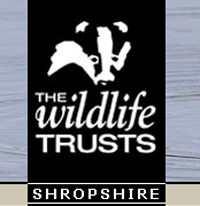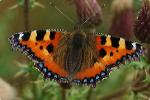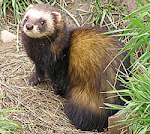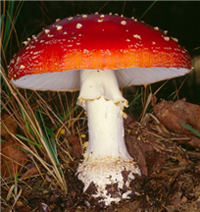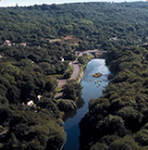I must begin with an apology. I had only meant to jump out of the darkened stone walled chamber and with a roar make my fellow castle explorer jump a little. Instead he just groaned at the predictable and not unexpected attempt to surprise, but I had surprised something. The slumbering bat above us was stunned into grumpy wakefulness. Hanging upside down, his wings folded alongside his body, the bat wrinkled his mouth and nose in annoyance and what I took at first to be the angry V of furrowed eyebrows but were actually ears, twitched and signalled his tetchiness. This Daubenton’s bat had chosen to spend its daytime roost in the gloom of one of Hopton Castle’s remaining rooms. Bats collect sound waves to help them navigate by a form of sonar, this aural sensitivity the result of an evolutionary road that lead to flight and a nocturnal lifestyle to avoid predators and establish a niche in a crowded natural world. It also made it vulnerable to the rowdy bellow of this clumsy visitor.
The night time world attracts its own distinctive fauna. Driving back via Mile End services on the A5 we were passed by a barn owl, this large light coloured bird had skirted over the roundabout and twisting past a road sign, headed off into the fields beyond. Later as we headed down the homeward lane I was able to swerve and avoid adding a hedgehog to the toll of road traffic victims. This reminded me that a few weeks earlier I had found a slow worm, minus tail, which had succumbed to injury on a quiet back lane near Llangollen. Both the hedgehog and barn owl run great risks from vehicles, the owl specifically from high sided vehicles. The hedgehog is a danger to itself as its reaction to imminent threat is to curl up into a prickly ball!
The Hedgehog is Britain’s only spiny mammal, an unfussy eater of beetles, caterpillars and earthworms, a good swimmer and though vulnerable to man-made dangers a determined adult with its 5000 spines can deter most natural predators. They are usually nocturnal, though we recently stopped to allow an adult to pass us when on a trip to Montgomery. At this time of the year the young are busy foraging for those vital fat reserves to carry them through the winter hibernation. Late born hoglets tend not to survive the winter and may also be abandoned by the mother if the nest site is disturbed, though juveniles will be carried to safety. Hedgehogs are inquisitive, nosing out slugs and other morsels around the garden. Sadly many fall victim to accidental poisoning by the use of chemicals such as metaldehyde which is found in blue slug pellets. This chemical persists and will eventually find its way into our rivers and is a major pollutant. It is extremely difficult to remove during water treatment and compromises our wildlife and water supplies nationally.
It is not only our mammals that take refuge in the dark. In the matrix of ivy above the chicken coop the gang had noticed numerous small, feathery grey bundles. Going back out with a torch, a closer look revealed exactly where that flock of sparrows goes to after a busy day eating the scattered chicken feed, missed by the pecking egg-layers below. House sparrows are a gregarious species, hanging around in mixed groups of males and females, the many eyes of the flock alert for danger. The torch revealed that not all the birds were asleep at the same time, a few watchful eyes keeping their snoozing fellows safe till the dawn flight.
Night or day carries great danger for our wildlife as it adapts to dominate one cycle while hiding away in another. Even with such fine tuning in behaviour and habit close escapes can occur, like our garden toad who attracted by the slugs underneath our tin can recycling box had taken to resting up in an empty can to avoid the drying heat of the day. That was until I decided to flatten all the cans with a heavy wooden mallet, fortunately I had to empty the rainwater from the cans and found our toad mate before the hammer fell!
Happy wildlife spotting whether night or day, regards Pete
13 Oct 2012
Subscribe to:
Comments (Atom)




